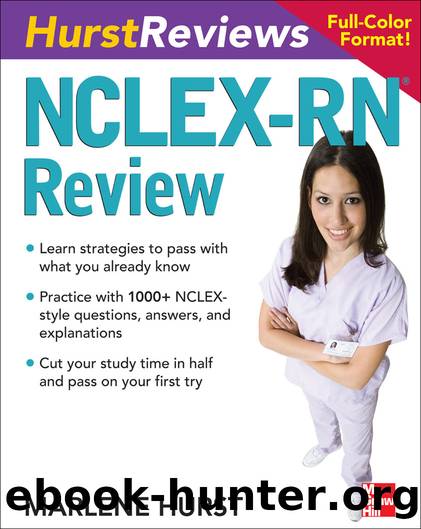Hurst Reviews NCLEX-RN Review by Marlene Hurst

Author:Marlene Hurst
Language: eng
Format: epub, azw3
Publisher: McGraw-Hill Education
Published: 2008-09-14T16:00:00+00:00
HEALTH PROMOTION AND MAINTENANCE
1. Elderly clients who take several medications are at risk for adverse drug reactions and interactions. The most important nursing action to prevent such risk is:
A. Implementing a thorough client assessment.
B. Instructing the client about adverse drug reactions.
C. Explaining to the client that approximately 12% of hospital admissions of older adults are due to a drug reaction.
D. Teaching the client that the chances of adverse drug reactions are directly proportional to the number of medications taken.
Answer: A. To prevent complications of medication administration, such as adverse drug reactions and interactions, careful planning is a priority. A thorough assessment of the client is vital when planning care. Instructing the client about adverse drug reactions, explaining the prevalence of drug reactions in the elderly, and teaching the client that risk increases with the number of medications taken are true statements that support client education.
TEST-TAKING STRATEGY: Home in on the key words in the stem like most important. Then eliminate the incorrect answers while focusing on the answer that provides information or an action that is the most important.
2. An adult client presents with a new onset of a chronic disease. The nurse can benefit the client most by:
A. Teaching the client that the disease will never resolve.
B. Instructing the client that lifestyle changes must be made.
C. Treating the client as a competent manager of the disease.
D. Encouraging the client to prepare for custodial care.
Answer: C. Viewing the client as a manager of care demonstrates respect for the client, dispels stereotyping, and establishes trust between client and caregiver. A chronic disease will not resolve, but may be managed. Often, lifestyle changes are necessary when disease develops, but there are instances when this is not applicable. Many chronic diseases can be managed without the need for custodial care, especially at the onset.
TEST-TAKING STRATEGY: Home in on the key words in the stem like most. Then eliminate the incorrect answers while focusing on the answer that provides information or an action that is the most beneficial.
3. The older client who lives in a rural setting is most likely to (select all that apply):
A. Exhibit healthy behaviors.
B. Experience longevity.
C. Be underserved by health care workers.
D. Fail to engage in health-promoting activities.
Answer: C & D. The average client living in a rural setting experiences geographic isolation and a higher level of poverty than those living in metropolitan or suburban areas. Health care access is diminished by the lower number of health care workers in a rural setting and the decreased availability of public transportation. This limits health screening, frequent client–physician counseling, and early detection of disease. The client living in a rural area is more likely to engage in activities that do not promote health, such as smoking and driving without a seatbelt.
TEST-TAKING STRATEGY: In “select all that apply” questions, there may be one or more than one correct answers. Terms like “most likely” mean that the undeniable correct answer is probably not present. Therefore, you must select the best answer from the choices presented.
Download
Hurst Reviews NCLEX-RN Review by Marlene Hurst.azw3
This site does not store any files on its server. We only index and link to content provided by other sites. Please contact the content providers to delete copyright contents if any and email us, we'll remove relevant links or contents immediately.
| Administration & Medicine Economics | Allied Health Professions |
| Basic Sciences | Dentistry |
| History | Medical Informatics |
| Medicine | Nursing |
| Pharmacology | Psychology |
| Research | Veterinary Medicine |
Periodization Training for Sports by Tudor Bompa(8243)
Why We Sleep: Unlocking the Power of Sleep and Dreams by Matthew Walker(6689)
Paper Towns by Green John(5171)
The Immortal Life of Henrietta Lacks by Rebecca Skloot(4570)
The Sports Rules Book by Human Kinetics(4374)
Dynamic Alignment Through Imagery by Eric Franklin(4202)
ACSM's Complete Guide to Fitness & Health by ACSM(4046)
Kaplan MCAT Organic Chemistry Review: Created for MCAT 2015 (Kaplan Test Prep) by Kaplan(3994)
Introduction to Kinesiology by Shirl J. Hoffman(3757)
Livewired by David Eagleman(3757)
The Death of the Heart by Elizabeth Bowen(3599)
The River of Consciousness by Oliver Sacks(3590)
Alchemy and Alchemists by C. J. S. Thompson(3506)
Bad Pharma by Ben Goldacre(3415)
Descartes' Error by Antonio Damasio(3264)
The Emperor of All Maladies: A Biography of Cancer by Siddhartha Mukherjee(3135)
The Gene: An Intimate History by Siddhartha Mukherjee(3087)
The Fate of Rome: Climate, Disease, and the End of an Empire (The Princeton History of the Ancient World) by Kyle Harper(3051)
Kaplan MCAT Behavioral Sciences Review: Created for MCAT 2015 (Kaplan Test Prep) by Kaplan(2975)
